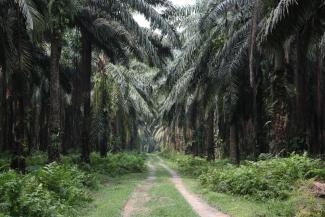Deforestation
A legacy of destruction

To meet international demand, companies with logging rights quickly cleared forests. No environmental safeguards were in place. The forests did not absorb as much carbon from the atmosphere as before and did not host as many varieties of plants and animals. Making matters even worse, the depleted forests became giant fire hazards.
In 1982/1983 the region was hit by the El Niño weather system, a variation in winds and sea surface temperatures. The impact was a severe drought. When farmers and plantation owners started burning trees and vegetation to clear land for planting, the fires quickly spread out of control. Among other things, they ignited the highly combustible logging waste strewn everywhere. Peat swamps and surface coal deposits burned as well. The “Great Fire of Borneo” set ablaze 3.2 million hectares in East Kalimantan, 2.7 million of which were tropical rainforests.
Despite the massive damage, unregulated deforestation accelerated in the late 1980s. The paper and pulp industry grew quickly – once again boosted by large government subsidies. From 1988 to 2010, Indonesian pulp production expanded from 368,000 to 7 million metric tons per year, and paper production expanded from 30,000 to 10.5 million tons. Millions of hectares of natural forests were cut down in order to supply wood to the mills.
Starting in the mid-1990s, conglomerates with ties to Suharto began to invest massively in palm plantations to produce palm oil. Moreover, Malaysian palm-oil companies also started to expand into Indonesia, attracted by low costs for land and labour. Palm-oil production got a further boost from the mandated use of vegetable oils in biofuels in the USA (2007) and the European Union (2009).
From 1990 to 2015, the area planted with oil-producing palm trees grew from 1.1 million hectares to 11.3 million hectares in Indonesia. Indonesia today produces over 60 % of the world’s palm oil. In the 1990s and 2000s, up to 80 % of new oil-palm plantations were planted on land that previously hosted tropical forests.







